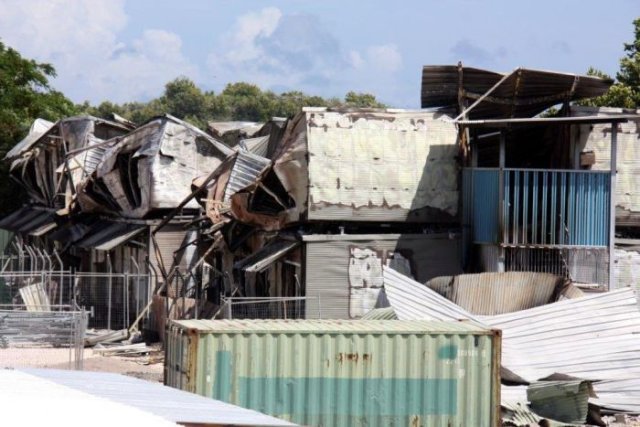
The so-called riot that burned down much of the Nauru detention camp began as a peaceful protest by refugees wanting their asylum processing to begin.
The July 19 protests by almost all of the 500 men held in the compound “was not borne out of malice,” the Salvation Army said in a statement on July 23.
“It was a build up of pressure and anxiety over 10 months of degrading treatment, and a planned peaceful protest that degenerated. It was a reaction to a refugee processing system that is devoid of logic and fairness.”
Yet opposition immigration spokesperson Scott Morrison made the extraordinary claim that the detention regime simply wasn't being implemented “effectively”.
"More chaos is no surprise when it comes to this government on these issues, because they just don't know how to implement things effectively,” he said.
Yet when Australia's detention network was operated by the former Coalition government, thousands of men, women and children suffered for years under a disastrous regime that was negligent to the point of barbarity.
Morrison's claims ignore the huge uprisings inside refugee camps such as Woomera and Baxter over 1999-2002, which included buildings being destroyed and mass-breakouts. Woomera was the site of more than two years of rebellion, hunger strikes, lip-stitching and breakouts.
The ongoing conflicts raised national awareness about the appalling state of conditions under mandatory detention, and led to several convergences of hundreds of people on the centres where the biggest uprisings occurred.
The government responded by initiating offshore processing, which began with an agreement between Australia and Nauru to take refugees from the MV Tampa in 2001, in an attempt to conceal the plight of refugees from public scrutiny.
It was there that same climate of desperation and resistance once again grew.
Detainees frequently resorted to hunger strikes and the Coalition government rarely managed them well. A hunger strike over December 2003 to January 2004 involving about 40 refugees was only suspended when they were promised a visit from the Australian Medical Association (AMA).
The hunger strike began on December 10, seeking reviews of their cases by the UN refugee agency. By January 8, many were being feed intravenously, four had sown their lips together and were also planning to sew their eyes together when the Nauru government finally asked the AMA to travel to the island.
Green Left Weekly reported at the time: “Nauruan finance minister Kinza Clodumar charged that Australia had neglected its humanitarian duties and broken its memorandum of understanding with the Nauru government over the care of the asylum seekers.”
AMA representatives began planning the trip and said there were more than enough willing doctors wanting to help asylum seekers and end “the crisis” on Nauru.
The Australian government had largely ignored the hunger strike, though public pressure grew as it wore on. But as soon as the hunger strike was suspended, Liberal ministers Alexander Downer and Amanda Vanstone made moves to block the AMA visit.
GLW reported that the AMA team was refused access to the weekly chartered flight to Nauru. Vanstone reportedly pressured Nauru not to issue visas to the doctors.
The doctors were eventually forced to cancel their visit. Refusal to allow even independent doctors to the visit the centre showed the Australian government’s despicable attempts to keep conditions inside the centre hidden from the Australian public.
But a letter to refugee advocates from more than six months beforehand exposed the chaotic camp conditions, run by the International Organisation for Migration (IOM), which had lasted more than two years. The letter details inadequate medical provisions, appalling food supplies and dangerously low fresh-water access.
The letter from June 2003 read: "Some people have lost their eyesight and need to see an eye specialist. They have been waiting to have their eyes checked since they arrived in Nauru. There are over 60 persons who need to see a dentist but the dentists only see two patients in a week in Nauru hospital.
"We are not provided appropriate food. We are provided rotten vegetables and beans full of insects. We are provided one apple or one orange in our lunch but we haven't had any fruits for the last 10 days.
"We are not provided enough water for washing. There is salty water in bathrooms just for four to six hours a day [and clean water only one to two hours a day].
"Whenever we put pressure on IOM for fulfilment of our legal demands, IOM send us directly to prison. We must follow whatever IOM and DIMIA [the then immigration department] tell us otherwise we are put in a Nauru prison.
"No one is allowed to enter [the camp] except government agencies and IOM. So we don't have access to any journalist to speak about our situation and convey our messages to the people."
It was due to these horrific conditions that Labor closed the Nauru camp in 2007, and which it is now recreating to try to outdo the Coalition's cruelty. Whoever runs the camp the outcome will always be the same — innocent people suffering intolerable and indefinite horror will resist and fight for their lives.